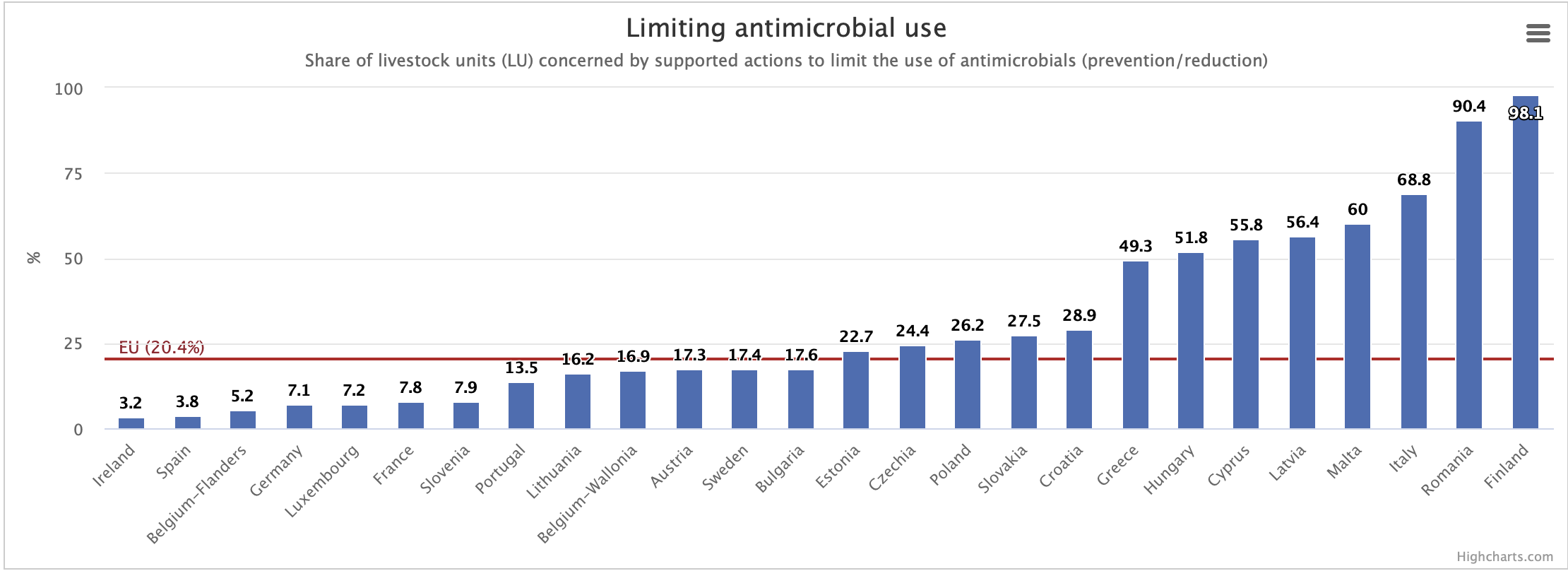



CAP support aiding fight against antimicrobial resistance on EU farms
The Commission has adopted new actions to tackle antimicrobial resistanceAntimicrobial resistance – the ability of microorganisms to resist antimicrobial treatments, especially antibiotics – has a direct impact on human and animal health. The Farm to Fork strategy sets out the objective to reduce by 50% the overall EU sales of antimicrobials for farmed animals and in aquaculture by 2030, according to a news article from the European Commission. EU countries, in their CAP Strategic Plans, have planned several measures to step up the fight against antimicrobial resistance and increase animal welfare in farmed animals, supported by funding from the Common Agricultural Policy (CAP).
Some of the key challenges facing EU agriculture include improving its response to society’s demands concerning food and health - including safe, nutritious and sustainable food,
reductions in food waste, and improvements to animal health and welfare. The Commission adopted today its pharmaceutical package and further actions to enhance the fight against antimicrobial resistance. It is proven that the overuse of antibiotics in farmed animals directly result in an increased antimicrobial resistance in humans. The fight against antimicrobial resistance must be led on all fronts, and the Common Agricultural Policy complements policy and financial actions being led at national and EU level.
For the current programming period 2023-27, almost all EU countries included measures for specific support for higher levels of animal welfare and for combating antimicrobial resistance in their CAP Strategic Plans. This covers a wide range of species, through combinations of practices, investments, cooperation and training. In total, €6.3 billion of EU funding is earmarked to support voluntary actions under eco-schemes and rural development.Overall, this support aims to reach 23% of EU livestock units.
EU farmers may receive funds for investing in newly built or renovated housing systems to improve the welfare of their livestock and reduce the need to treat animals with antibiotics. Under rural development measures, farmers may seek support in participating in animal welfare labelling schemes or establishing radication programmes for animal diseases.
The support allocated to organic farming also contributes to better animal welfare. It also reduces the use of antimicrobials as the requirements for antibiotic use for animals bred organically are much more stringent than for animals under conventional farming methods. The size of the area that receives specific CAP support for organic production in 2027 will almost double, reaching close to 10%, compared to the area funded in 2020 (5.6%).
In its previous programming period 2014-20, the CAP had already supported several measures contributing to animal welfare and antimicrobial use reduction. A study evaluating these measures and their impact was published in May 2022. In most of the regions/Member States studied, animal welfare and antimicrobial use were mostly addressed through rural development measures. They proved to be most effective when combining investments in better housing conditions, feeding, and health management. For example, by increasing awareness among farmers via advisory services, commitments and training. In most Member States/regions studied, cross-compliance through requirements of the EU legislation on animal welfare and food law was effective in influencing farmers’ practices.
Research programme Horizon Europe has several ongoing or planned projects on animal health, such as vaccine development, and on animal welfare. A European Partnership on animal health and welfare will be launched this year. The partnership would target antimicrobial use and resistance in livestock as part of its priorities. It aims, among other things, to generate knowledge and develop products and services to improve prevention and control of diseases. The total indicative EU contribution for the full duration of the partnership is €180 million euro.
This public support comes in addition to all measures taken and funded at national level by EU countries.




